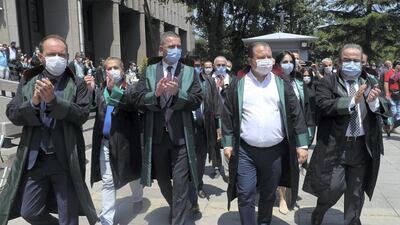Police arrested 27 lawyers across Turkey on Tuesday in what critics say is a growing threat to the legal profession and to the right for representation in court.
The detentions, which came in an operation against 66 suspects in 19 provinces, are part of a wider campaign against the group that was accused of orchestrating a failed coup in 2016.
But some observers say lawyers became targets after representing people accused of terrorism offences and that it is part of a government strategy to undermine the profession, which has been among Ankara's most vocal critics.
The Ankara Bar Association condemned the detentions as intimidation that identifies lawyers with the crimes of their clients.
Lawyer and MP Mustafa Yeneroglu, who defected from Turkey's ruling party to help establish a centre-right opposition party this year, said the arrests were unlawful.
“The aim of punishing the attorneys, suspects and defendants simply due to their professional practices within the scope of their defence is clearly trampling on the law,” Mr Yeneroglu said.
Hugh Williamson, regional director of Human Rights Watch, said the detentions sought to “further erode the legal profession’s ability to uphold the rule of law and to ensure that everyone accused of a crime enjoys their right to a legal defence”.
Since the coup attempt, which led to the deaths of at least 250 people, about 77,000 people have been arrested and more than 130,000 dismissed from public sector jobs, including among the judiciary, police and military.
The government said the rebellion was organised by a network led by Fethullah Gulen, a former imam who lives in exile in the US, who started an organisation with millions of followers from the 1970s onwards.
The group was once allied to President Recep Tayyip Erdogan.
It was named the Fethullah Terrorist Organisation by the government and is now banned in Turkey. Mr Gulen denies any connection to the coup attempt.
Lawyers have also faced prosecution over alleged links to Kurdish and left-wing organisations.
Ebru Timtik, a member of the Contemporary Lawyers' Association, died on hunger strike last month protesting against her conviction for supporting the Revolutionary People’s Liberation Party-Front, an outlawed Marxist group.
Along with other lawyers, Timtik said she was tried unfairly and convicted on the basis of testimony from secret witnesses, a common feature of terrorism cases.
Her sentence was overturned by the Supreme Court two weeks after her death.
The Istanbul Bar Association now faces a criminal inquiry after a banner depicting Timtik was hung from its offices after her death.
In a sign of the gathering campaign against the legal profession, Mr Erdogan this month suggested lawyers accused of ties to terrorism should be disbarred.
He told judges and prosecutors at an event in Ankara that bar associations had become “the back yard of terror organisations".
“We will do what is necessary to cut this bloody path from lawyer to terrorism," Mr Erdogan said.
Turkey’s lawyers also face recent legislation that changes the structure of bar associations to allow several associations in each province instead of only one.
The move dilutes the influence of associations by permitting pro-government rivals to be established.

